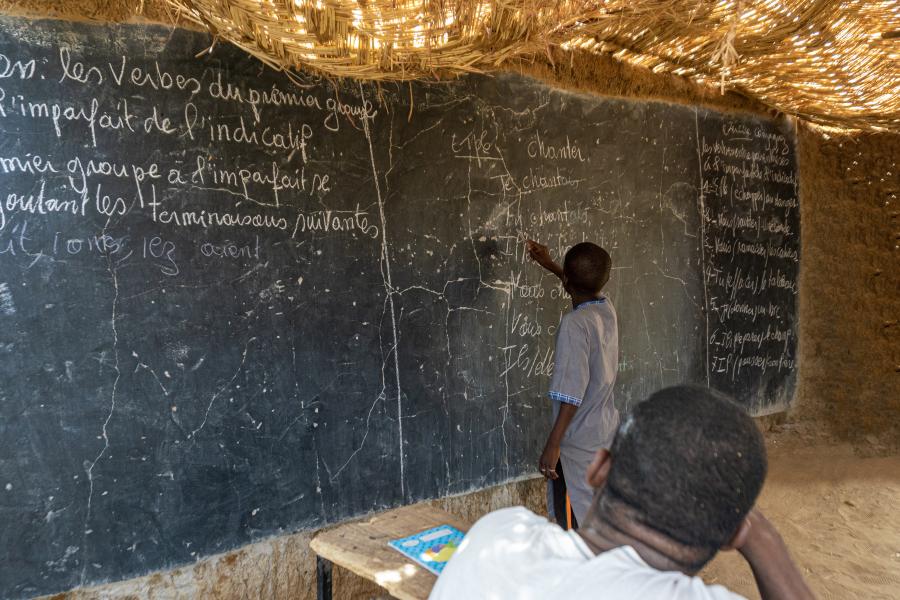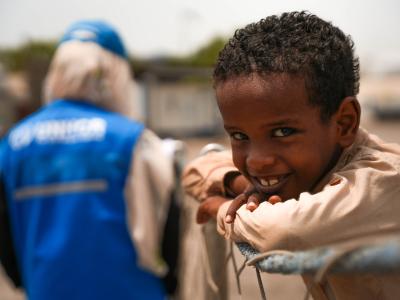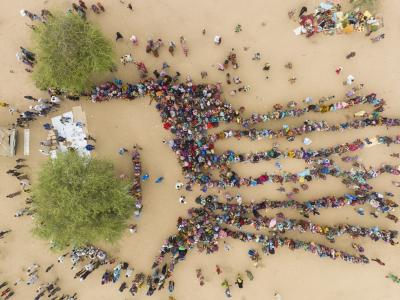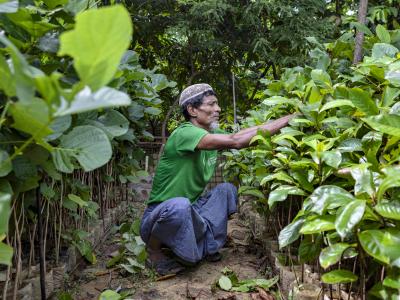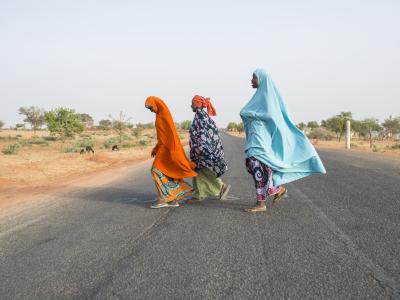Results in 2023
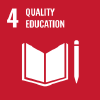
In 2023, the global need for refugee education significantly intensified, with a record number of forcibly displaced people around the world. The school-aged refugee population had already increased from 10 million in 2021 to 14.8 million by the end of 2022, with a reported 51% of these children not enrolled in school.
Refugee children still do not have the same access to education as non-refugee children. While the global average primary gross enrolment rate was 102%, it was only 65% for refugee children. Global secondary gross enrolment averaged 77%, but just 41% for refugees, with significant regional disparities.
UNHCR's primary focus is on ensuring the equitable and sustainable integration of refugee, asylum-seeker and stateless children and youth into national education systems. The Global Compact on Refugees “Indicator report 2023” found, based on data from 51 countries, that 73% of countries had laws allowing refugees to access national primary education systems. However, legal rights did not always translate to access in practice, with the same report finding that only 48% of refugee children of primary and secondary school age in reporting countries were enrolled in national education systems. In 2023, the estimate was 51%, based on data from 52 UNHCR country operations. To improve, barriers related to nationality, legal status, and documentation must be addressed to enable refugee children to effectively enrol in schools.
The Global Refugee Forum produced three multi-stakeholder pledges on education, including one spearheaded by the World Bank, the UK FCDO, Germany, Canada, Denmark, the Global Partnership for Education (GPE), Education Cannot Wait and UNICEF, with a commitment to ensuring the inclusion of all refugee children in national education systems. With 143 countries and organizations endorsing it and over 100 extra pledges in support, this initiative is poised to drive significant future improvements in refugee education.
UNHCR acts as a convener towards greater enabling environments, and ensuring children and youth are able to overcome de facto barriers to attending school. UNHCR and UNESCO made the case for the inclusion of refugees in national education systems in a joint evidence-based report, “Paving pathways for inclusion”. Progress has been observed at the country level: in Kenya, where 107 UNHCR-managed schools serve around 145,000 children, policy changes toward refugee integration have attracted funds from the World Bank and GPE, supporting refugee education. The roll-out of the Refugee Education Integration Policy in the Kurdistan Region of Iraq resulted in a 20% uptick in enrolment among Syrian refugee children in grades 1 to 4.
Primary and tertiary education have made significant progress. In 2023, UNHCR successfully concluded the fourth phase of the UNHCR-Educate A Child (EAC) Programme supported by the Education Above All Foundation, Qatar, with 419,815 out-of-school refugee children enrolled in primary education across 14 countries within the multi-year programme cycle. The Primary Impact Programme was launched in 16 countries, an initiative to increase access to primary education.
In 2023, the global tertiary enrolment rate for refugees rose to 7%, up from 1% in 2019, a slow but steady advancement towards the goal of achieving 15% enrolment of refugee youth in higher education by 2030. The Global Refugee Forum multi-stakeholder pledge on higher education for self-reliance encompasses a range of needs and contributions associated to the 15by30 target, including scholarships, academic guidance, testing fee waivers, digital education facilities, language and skills training, complementary education pathways, student solidarity actions and more.
UNHCR and a coalition of partners issued the first global report on 15by30, which stresses the need for additional support to host country higher education institutions and refugee-youth-led initiatives to expand post-secondary education pathways for refugees, including through technical and vocational training and online degree programmes. The DAFI scholarship programme is the foundation for UNHCR’s higher education approaches and supported 9,312 refugee students in 59 countries in 2023. The DAFI programme was the subject of an evaluation published in 2023.
Data and evidence in education was also strengthened in 2023. More than 70 countries contributed data to the 2023 edition of UNHCR’s annual “Refugee education report”, an almost 50% increase compared to 2022. UNHCR also contributed significantly to the literature on forced displacement in education, including our work on “Building the evidence on forced displacement” with the World Bank and other partners, and a series of global public goods summarized in the UNHCR “Education briefs”.
UNHCR’s partnership with the Vodafone Foundation-funded Instant Network Schools programme benefited over 80,606 students and 3,886 teachers in six countries in 2023: the Democratic Republic of the Congo, Egypt, Kenya, Mozambique, South Sudan and the United Republic of Tanzania. The partnership also announced an expansion of the programme, which has reached 274,288 children and 4,705 teachers since its inception in 2013. Additionally, UNHCR's collaboration with ProFuturo in Rwanda, Nigeria, and Zimbabwe helped over 25,000 children and nearly 1,000 teachers in 2023. Vodafone and ProFuturo were among the backers of a GRF multi-stakeholder pledge to increase refugees’ access to quality connected education through the Refugee Connected Education Challenge.
Core indicators

11.1 Proportion of young people enrolled in tertiary and higher education

11.2 Proportion of children and young people enrolled in the national education system

ProFuturo commits to transforming futures
ProFuturo Foundation [in Spanish] has reaffirmed its commitment to the Connected Education Project led by UNHCR in Nigeria, Rwanda and Zimbabwe. The project aims to bridge the education gap between refugee and non-refugee populations with technology. In 2023 alone, 586 teachers across 24 schools in the three countries received ProFuturo's training. As a result, these educators have revolutionized learning by integrating digital activities and innovative methodologies into their classrooms, significantly improving student engagement.
ProFuturo also played a pivotal role in the Global Refugee Forum by pledging, alongside other actors, towards expanding connected education for refugees through the Refugee Connected Education Challenge.
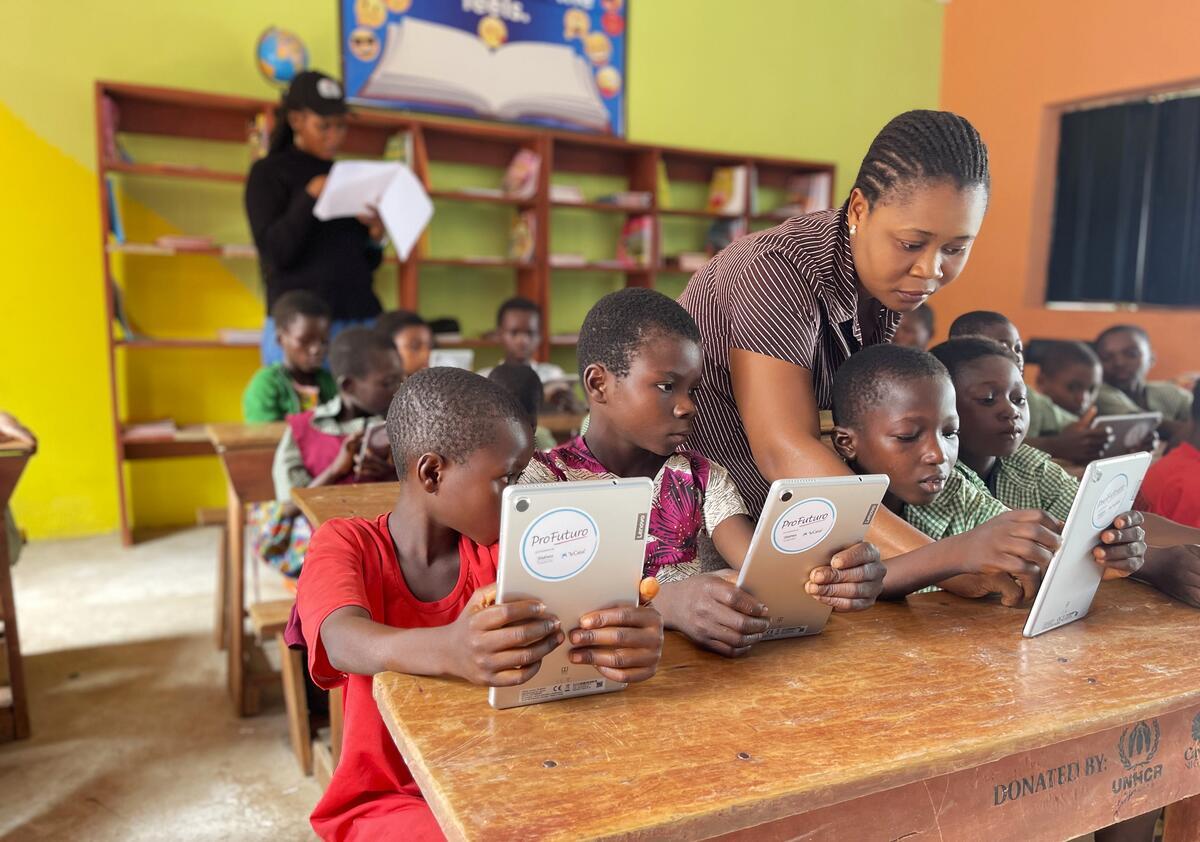
Challenges to achieving outcomes
At the start of 2023, UNHCR requested $466 million to continue supporting the education of refugee children and other forcibly displaced and stateless people. However, UNHCR received only around half of the requested funding. The chronic shortfall in education funding is expected to increase the number of refugee children out of school, potentially creating significant challenges in individual and community human development and adversely affecting their future prospects.
Furthermore, refugee inclusion into national education systems has proved challenging due to lack of financial support and resources to system strengthening which is required to meet positive policy shifts. Predictable multi-year financing or programme support, which benefits both refugee and host communities, is essential, particularly in lower and lower-middle-income host countries. There is a long way to go to meet the World Bank estimate of $9.3 billion a year required to include all refugees in national systems. Funding for refugee education is under immense pressure, putting the futures of some of the world's most vulnerable children in jeopardy.
Financial overview
Global expenditure and budget for Education
$211 million spent against a budget of $478 million
$267 million of unmet needs or 56% of the budget
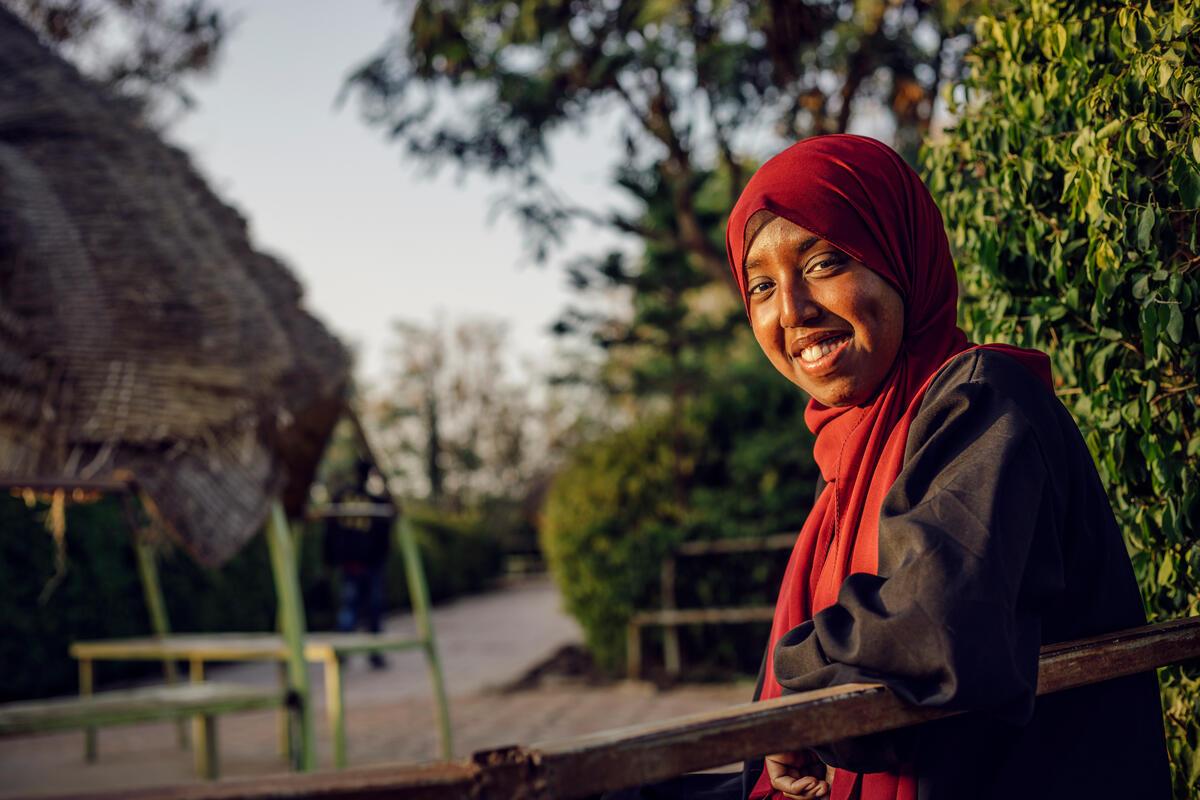

Nanji Family Foundation helps refugee students aim higher
The Nanji Family Foundation commemorated the 50th anniversary of the family’s exile from Uganda, along with tens of thousands of other South Asians expelled in 1972, by pledging $1 million over four years towards UNHCR’s Aiming Higher campaign.
2023 was the second year in the partnership, which is funding scholarships for over 50 refugees seeking health-related university studies, including career training, internships, mentoring, and volunteering and networking opportunities. Supporting refugees’ higher learning has been a long-held aspiration of the foundation, as well as encouraging others to similarly support opportunities for displaced youth.
